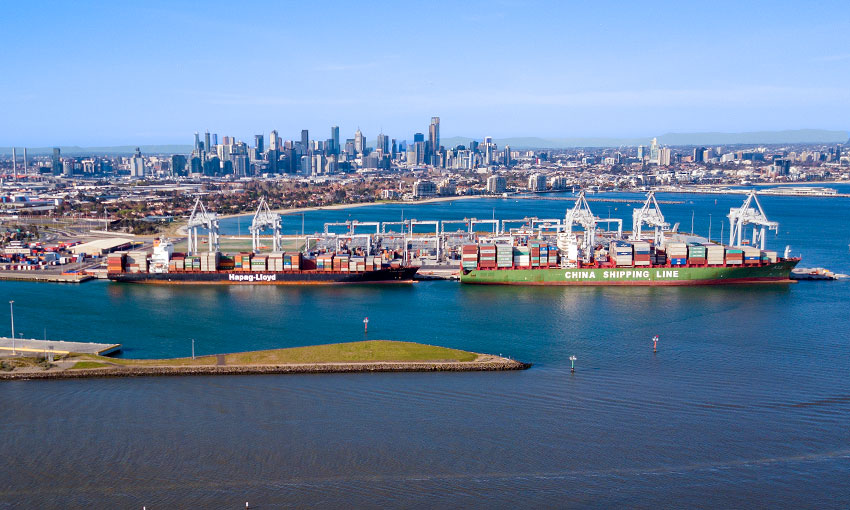THE MARITIME Union is expanding its legally protected industrial action at the Victoria International Container Terminal at Melbourne’s Webb Dock with more work stoppages and bans.
The union announced a new 12-hour stoppage from 18.00 on Friday 19 February and a 36-hour stoppage from 06.00 on Sunday 21 February, in addition to the previously announced four-hour stoppage on Tuesday 16 February.
In a statement, the MUA said it would ensure any containers that contain medicines, medical supplies or urgent medical equipment are exempt from the industrial action. The union said it would also exempt all refrigerated containers in an effort to minimise impact on agricultural exports, fresh food and perishable goods.
The union also said it would provide “extended notice of planned actions to assist the company with making appropriate arrangements for essential goods”.
A spokesperson for VICT told DCN, “The MUA’s offer to exempt medical supplies and fresh produce is totally disingenuous; it is unworkable and demonstrates their misunderstanding of our industry”.
“All this nonsensical offer tells us is that the MUA knows that its campaign against VICT’s automated terminal will have serious impacts on the Victorian, Tasmanian and wider Australian communities,” the VICT spokesperson said.
“It is trying to get off the hook in advance.”
MUA Western Australia branch secretary Will Tracey, who is co-ordinating negotiations, said It has always been the union’s practice to grant exemptions for essential cargo, reducing any adverse impacts on third parties from bans and stoppages.
“We have written to VICT outlining our proposed exemptions for all containers carrying medicines, essential medical supplies, and urgent medical equipment, along with any refrigerated containers, such as those used to transport agricultural exports and perishable goods,” he said.
“We have requested the assistance of the company to identify any containers carrying essential cargoes to allow our members to move them as a priority, but we will need their cooperation to protect the community from any adverse impacts.”
Mr Tracey said the company has refused to address “unacceptable and unsafe working conditions”.
“VICT thinks that just because this container terminal is automated, they can treat workers like robots,” Mr Tracey said.
He said many workers had been required to work “huge” amounts of overtime – in some cases between 50 and 70 additional 12-hour shifts over the past year – because the company “refuses to employ enough people”.
Mr Tracey said VICT had refused to address the issues raised by their Australian workforce.
“VICT is still in denial about why 95% of the workforce has joined the union in recent years, why they have overwhelmingly rejected the company’s last two proposed agreements, and why 100% voted to take industrial action,” he said.
Further bans
The union is also instituting several work bans in addition to the work stoppages. From Monday 22 February, workers in the control room at VICT will be banned from operating cranes unless each crane is manned by a dedicated quayside supervisor. There will also be an indefinite ban on overtime and various restrictions on communications.
In a press statement, VICT said the “over-manning and restrictive work practices” undermine the “competitiveness the terminal derives from its automated technology and modern way of working”.
VICT CEO Tim Vancampen said he was amazed the MUA would even consider this sort of attack while the Victorian economy was already at a standstill owing to its third lock-down.
“VICT accounts for a third of Victoria’s container freight. The union is directly attacking VICT’s unique way of working as a modern, automated terminal. They want to take us back to the past, no matter the cost or the ill-considered timing in the context of the lockdown,” Mr Vancampen said.
“This campaign won’t produce the extra jobs, massive pay rises and fewer hours the Union has promised our employees. All it will do is undermine VICT’s competitiveness and threaten the benefits of port automation for Victoria and for the Port of Melbourne.
“If the MUA was serious about representing VICT employees’ interests it would seek to protect their modern jobs, not jeopardise them,” Mr Vancampen said.
Call for government intervention
Shipping Australia CEO Melwyn Noronha expressed SAL’s sympathy for families, importers, exporters, and the trucking and logistics industries, which he said were already suffering during the pandemic. He said strikes at Australia’s major container terminals adversely affect ordinary Australian families.
“Our importers and exporters will likely face increased difficulties and delay because of strikes and work bans. They may also face increased costs as they try to arrange workarounds to cope with the strike by, for example, arranging for their shipments to be re-routed,” Mr Noronha said.
“Meanwhile, our logistics industries – which accounts for about 10% of the Australian workforce – will be adversely affected too. Then there’s the adverse affect on our farmers’ ability to sell their products overseas in an effort to recover from years of drought, the recent bushfires and COVID.
“At a time when global and national economies are reeling, at a time when Australians have been forced out of work, at a time when many people are struggling to find the money to keep a roof over their head and food on their plate, it is contemptible that the union is – again – trying to cripple the Australian economy and the ability of Australians to earn a living. And for what? For their own selfish interests.”
Mr Noronha said the shipping industry will also be gravely impacted in the form of delays and costs, which in turn will seriously affect schedules and services.
“It really is time for the federal government to recognise the vital importance of the international container trade,” he said.
“Shipping Australia calls for the federal government to intervene and to protect Australians from this reckless strike action.”
This article was updated to include further information from VICT and comment from Shipping Australia.

